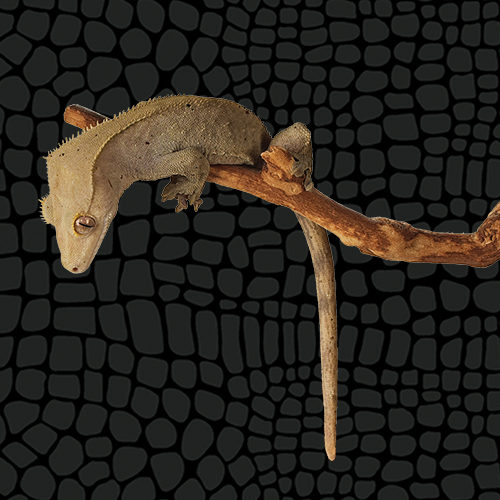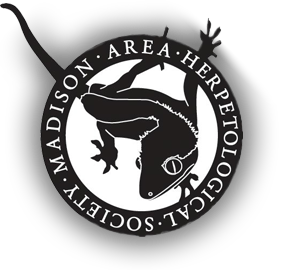Crested Gecko
History
Until 1994, the crested gecko was thought to be extinct. Imports to the island of New Caledonia brought a destructive species of ant and rats, which killed many of the native species of geckos on the island. In 1994, a team of researchers on the islands rediscovered the geckos and brought them into captivity. Originally, little was known about them, but through care in captivity, they were found to be easy to keep and breed, and were very prolific. Their ease of care along with their small size, amazing range of color and pattern, and great personality has made them one of the most popular geckos kept in captivity today.
Habitat
Crested geckos come from the island country of New Caledonia. They are found on the principal island, Grand Terre, in the southern portion, and the Isle of Pines. These arboreal geckos spend the majority of their lives in low shrubs and small trees. The warm and humid season runs from November to March, where temperatures reach a high of 86°F, and the cooler, dry season is from June to August with temperatures reaching 72°F. Throughout the year, rains can reach up to 120 inches, making this Pacific island country very tropical.
Housing
Housing must be sealed and escape proof, and the size of terrarium recommended depends on the age of the gecko. If a juvenile gecko is put in too large of a cage, it may not eat well and get stressed out. For hatchlings up to six month old geckos, we recommend a 10 gallon Zilla Critter Cage or Zilla Vertical Tropical Kit. This allows the gecko to have plenty of room to explore, while not making them feel lost in a large and open enclosure. Once the gecko has grown past 6 months, you can increase his tank to a Zilla 18x18x25 Front Opening Terrarium, or keep it in its Zilla Vertical Tropical Kit, which can house one adult crested gecko for his whole life. If you decide to get more than one, make sure not to keep two males together, as they will fight, and don’t keep pair in a terrarium smaller than a Zilla 18x18x20 Front Opening Terrarium. When it comes to housing these animals, height is more important than footprint of the tank, since they like to climb. Provide plenty of real or artificial plants and branches for them to climb on, and try out the Zilla Vertical Décor and Zilla Spring Cave for some unique and functional décor options. Zilla Jungle Mix makes an amazing bedding that will hold humidity, and adding clumps of Zilla Terrarium Moss on top of it moss will add extra humidity to the terrarium.
Temperature, Lighting, and Humidity
Crested geckos are very sensitive to high temperatures, and shouldn’t be exposed to temperatures above 80°F for long, as it can be fatal. While they like their terrarium temperatures around 72-75°F, it’s good to keep a heat gradient in the tank. A small 25w Zilla Mini Halogen Bulb works well to add a little heat to a small area for basking, while not overheating the entire enclosure. While these geckos are crepuscular, meaning out at dusk and dawn, they still absorb small amounts of UVB, so a Zilla Mini Compact Fluorescent UVB Bulbs with the 25w Zilla Mini Halogen Bulb in a Dual Low Profile Fixture is a great lighting set up to keep your animal healthy and happy.
Being from a very tropical island, humidity is very important. Crested geckos rely on higher humidity in order to smell their food. To keep the humidity up in the terrarium, daily misting is necessary. They will also drink water from the leaves and terrarium walls when sprayed. A small Zilla Terraced Dish can be added to increase humidity, but it must be kept clean. It’s unlikely they will drink from it, so even with a water bowl, daily misting is still required.
Feeding and Diet
In the wild, crested geckos are omnivorous, meaning they eat insects and various fruits. In captivity, many commercially available crested gecko diets are available that contain most, if not all essential proteins, vitamins, and minerals needed. Insects such as crickets, can also be offered but should not be larger than snout to eye on the gecko. Feeding should happen 2-3 times weekly. Don’t forget to feed Zilla Gut Load Cricket Drink to your feeder insects, and spray them with Zilla Calcium Supplement and Zilla Vitamin Supplement Spray for added nutritional value. Offer food in a small dish at the base of a branch so the geckos don’t have to touch the ground to eat.
Handling
Crested geckos tolerate moderate levels of handling even as hatchlings. Handle crested geckos gently and deliberately but do not drop or injure the animal. When handling them, allow them to walk on and through your hands. Take care to not grab your gecko by its tail or it may detach if your gecko perceives you as a predator or a threat. Most adult crested geckos will settle down considerably and become quite docile and easily handled.
Also be sure to wash your hands after handling any animals.


